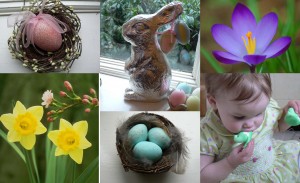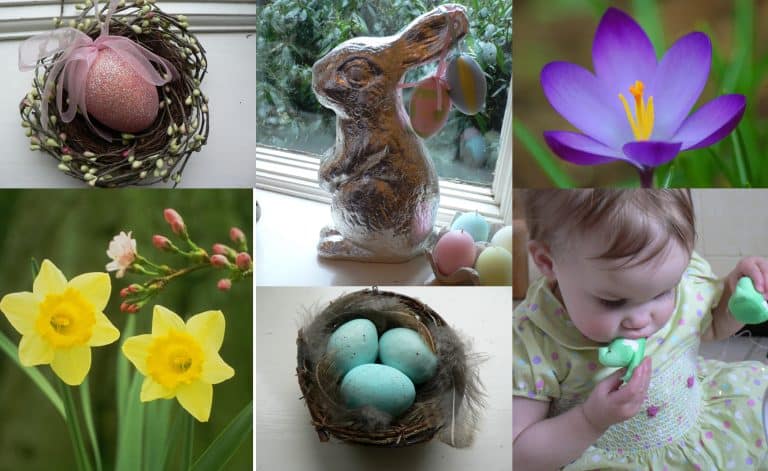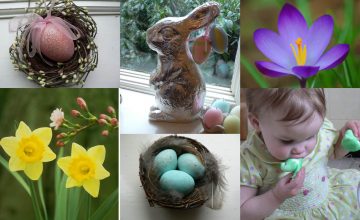 One of my favorite writers is the very irreverent David Sedaris. Because I taught English as a second language, I get a big kick out of his tales of studying French–especially the story about the difficulty of explaining Easter. “What is an Easter?” asks a Muslim student. As Sedaris and some of his fellow Christians attempt to explain the crucifixion, the atonement and resurrection of Jesus, they find their vocabulary sadly inadequate (and indeed absurd). A Polish student says Easter is “a party for the little boy of God who call his self Jesus.” Another chimes in, “He die one day and then go above my head to be with my father. He nice the Jesus.” So, as Sedaris puts it, “Faced with the challenge of explaining the cornerstone of Christianity, [they] did what any self-respecting group of people might do. [They] talked about food.”
One of my favorite writers is the very irreverent David Sedaris. Because I taught English as a second language, I get a big kick out of his tales of studying French–especially the story about the difficulty of explaining Easter. “What is an Easter?” asks a Muslim student. As Sedaris and some of his fellow Christians attempt to explain the crucifixion, the atonement and resurrection of Jesus, they find their vocabulary sadly inadequate (and indeed absurd). A Polish student says Easter is “a party for the little boy of God who call his self Jesus.” Another chimes in, “He die one day and then go above my head to be with my father. He nice the Jesus.” So, as Sedaris puts it, “Faced with the challenge of explaining the cornerstone of Christianity, [they] did what any self-respecting group of people might do. [They] talked about food.”
Even as a native speaker, I can relate to the difficulties of explaining abstract religious concepts. If I examine my own Easter vocabulary, phrases like “solid dark chocolate,” “lovely decoupage eggs,” “marshmallow Peeps”, and “funeral potatoes” are more common than phrases like “only begotten son,” “atoned for our suffereing,” and “He is risen.” One set denotes Easter as holiday, the other, Easter as holy day.
My earliest memories of Easter reflect this dichotomy.
When I was a little girl, we knew Easter was coming when my mom did two things. First, she took my sister and me to Sears to get new dresses. It was so exciting to try on fancy pastel frocks with scratchy lace and skirts that swung out when we’d twirl. Sometimes Angela and I matched. Sometimes not. We never got hats or gloves. New dresses were sufficient–anything more was just showing off.
The other marker of Easter was the visit to my Grandma Jessie’s grave. I enjoyed those visits. The grass was velvety to lie on, the air smelled of roses, and the grooved letters of my grandma’s name carved into stone were fun to trace. I never knew Jessie. I was 2 when she passed. Perhaps my parents used the opportunity to speak of the resurrection. I don’t remember. My mother has never been one to sermonize. Yet a connection was made for me that Easter was a time to look forward to reunions. My mother mourned her loss each April; Jessie was born on Easter Sunday in 1903. But I also think my mom chose early spring as the time to visit because she cherished Easter’s promise of resurrection, the holy day reminded her that she would indeed embrace her mother again.
Something else I have observed of my mom in the spring is that her heart turns to the soil. When I had gone through a particularly hard time a few years ago, some dear friends sent me 4 dozen mixed bulbs. Life in a box. I don’t share my mother’s green thumb and had never planted anything before and feared nothing would grow for me. I read and reread the instructions before tentatively planting the first bulb that fall. I found I enjoyed planting things and imagined the beautiful flowers that would grow. But a few days later I went outside and saw that my garden was pock marked with hole after hole where squirrels had dug up and stolen my floral treasures. I cursed those rodents and sobbed my heart out. It was as if the squirrels had taken my hope from me along with the daffodils and crocuses. But to my surprise, come spring, I had the loveliest flowers in my front yard. It was a little miracle. Flowers and faith can survive decimation.
Last spring the kids helped me bury bulbs. One of us would scoop out dirt with a little shovel, one would plop in a bulb, one would sprinkle it with Tabasco or “spicey wicey” to keep away the critters, and one would replace and pack the dirt. I can’t describe the joy I feel when the first little green sprouts show themselves. And these beautiful flowers keep coming back. Sometimes in winter, when my sweet flower beds are buried under 3 feet of packed, salty snow, I just know nothing can survive. But not too long ago, when it seemed winter would never end, I went out my front door and saw little purple crocuses poking their heads out of the ground. It called to mind a favorite primary song that beautifully parallels gardens and the resurrection:
On a golden springtime, underneath the ground,
A tiny seedling lay asleep until the sun shone down.
Awake, awake, O little seed!
Push upward to the light!
The day is bright. With all your might,
push upward to the light!
On a golden springtime, Jesus Christ awoke
And left the tomb where he had lain; the bands of death he broke.
Awake, awake, O sleeping world!
Look upward to the light,
For now all men may live again.
Look upward to the light!
On that first Easter Sunday, that holy day, women came to Christ’s tomb, found it empty, and were heart broken. Our hearts too are broken by our losses, large and small, tangible and intangible. Yet that empty space can be filled with hope. Faith can survive a dormant season. Easter means that the tomb is empty, because He is risen. He is risen. He is risen.






15 Responses
Thank you for your beautiful thoughts! I wish I had something profound to add, but mostly I just enjoyed reading what you wrote.
I love this so much, Heather! Easter is my favorite holiday; of course I love the pretty Easter dresses, the candy and dyed eggs but it is that ineffable feeling of re-awakening and redemption that makes this time so precious for me. Thanks for bringing that feeling into this post.
So enjoyed your article – it brought back memories of when my mom would make our Easter dresses, and we’d get new white socks! Most of all I enjoy the Easter season because of it’s sense of renewal, life is renewed once again, which in turn reminds me of the Saviour who sacrificed so much for me – renewing me on a daily basis. So thanks for the memories.
Beautiful, my friend.
Heather,
What a lovely post. Thank you, thank you for sharing this.
Yes that’s how I feel about spring bulbs too. When we moved into our new home this fall, I spent three weekends in a row planting bulbs in our new front yard. (took me three weeks because I had a 3-month old baby to take care of at that time…) but it was all worth it to see life return after that long hard snowy February.
thanks for this, heather. i think the distinction you make between holy day and holiday is an important one. we, as christians, strive to balance those conceptions for both easter and christmas. but i think your post captures potentially the very best way to achieve that balance–through recognizing the essence of the holy day and the holiday both in the world around us and the people in our lives.
thanks for this.
Thank you for this. The hope and joy you express is the same I feel every year when I plant my vegetable garden. In the fall, I feel a mix of mourning and comfort as my plants wither and I chop them up and mix them into the soil to nourish next year’s plants. There is a certain peace that comes with knowing even as I go into the winter that spring will come and these dying plants will make next year’s plants stronger. I wish I could go into life’s trials with the same philosophical peace, knowing that Christ’s life makes eventual spring-like joy possible.
A blessed Easter to you.
You dear friend. This is so poignant and sweet. I feel like I should read it to my children every Easter. Thank you for taking the time to write this down and for generously sharing it with the rest of us.
I enjoyed your flowers coming up this year ….
and didn’t understand their DEPTH….
THANK YOU HEATHER!!! xoxo
He is risen indeed.
I love this, Heather. Thank you.
I saved this to read today. I knew it would be exactly the right thing for me and it was. Thank you.
[…] communal suffering. I try to remember that empty things can be filled with hope and life. That Easter’s promise is not being spared death, but is an assurance of rebirth in some form. That in Matthew 28:8 the […]